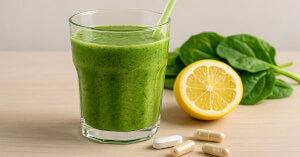
Which Digestive Enzymes Should You Take? The Most Effective Supplements Reviewed

Feeling bloated, sluggish, or heavy after meals? You’re not alone. Digestive discomfort affects millions of people, and often, poor enzyme activity is part of the problem. Digestive enzymes are natural proteins that break down the food you eat into absorbable nutrients. But when your body doesn’t produce enough of them, or the right types, digestion becomes a battle.
In this guide, we’ll walk you through exactly which digestive enzymes you might need, how they work, and which supplements are actually worth your time. Let’s make digestion feel good again.
What Are Digestive Enzymes and Why Do You Need Them?
Digestive enzymes are specialized proteins that help break down macronutrients like carbohydrates, proteins, and fats into smaller molecules your body can absorb. They’re naturally produced by your mouth, stomach, pancreas, and small intestine. But sometimes, your system needs a little backup.
If you’re not producing enough enzymes, due to age, stress, medications, or underlying conditions, food passes through your gut partially digested, leading to gas, bloating, and nutrient malabsorption. That’s where enzyme supplements can make a huge difference.
Signs You Might Need Digestive Enzyme Supplements
So how do you know if you need them? Here are common signs your digestion could use a helping hand:
- Feeling overly full or bloated after small meals
- Frequent gas or burping
- Undigested food in your stool
- Reactions to dairy, beans, or fatty foods
- Fatigue after eating (yes, that’s a thing!)
If you’ve been experiencing these symptoms regularly, it might be time to experiment with digestive enzymes, especially if dietary changes haven’t helped.
Main Types of Digestive Enzymes and Their Functions
Not all enzymes do the same job. Here’s a quick breakdown of the key players and what they target:
| Enzyme | What It Breaks Down | Common Source |
|---|---|---|
| Amylase | Starches & carbs | Saliva, pancreas |
| Protease | Proteins | Stomach, papaya, pineapple |
| Lipase | Fats | Pancreas, ox bile |
| Lactase | Lactose (milk sugar) | Yeast, fungi |
| Cellulase | Fiber | Fungi |
| Papain | Proteins | Papaya |
| Bromelain | Proteins, inflammation | Pineapple |
Best Digestive Enzyme Supplements (Reviewed)
Let’s get to the good stuff: which supplements actually work? Here are some of the most effective digestive enzymes, with links to learn more.
- Bromelain – Derived from pineapple, bromelain helps break down proteins and reduce inflammation. Great after protein-heavy meals or to soothe the gut.
- Papain – Extracted from papaya, papain supports protein digestion and is often used in meat tenderizers, that’s how powerful it is!
- Lactase – If dairy gives you trouble, lactase helps your body break down lactose, the sugar in milk. A must-have for lactose-intolerant folks.
- Lipase – This fat-digesting enzyme helps your body process oils and fatty meals more efficiently, particularly helpful if you’ve had your gallbladder removed.
- Amylase – Useful for breaking down carbs and starches, amylase supports smoother digestion of bread, pasta, and grains.
- Ox Bile – Though not technically an enzyme, it supports fat digestion and is often included in blends for those with bile insufficiency or sluggish gallbladders.
How to Choose the Right Enzyme for Your Needs
Choosing the right supplement depends on your symptoms and diet. Here’s a quick guide:
- Bloating and gas? Try a blend with protease, amylase, and lipase.
- Dairy problems? Go with a dedicated lactase supplement.
- High-fat meals? Look for formulas with lipase or ox bile.
- Plant-based diet? Add cellulase to break down tough fibers.
Also consider the source: plant-based enzymes (from fungi, papaya, pineapple) are more stable across pH levels and gentler on the stomach. Animal-based enzymes can be more targeted but may not suit vegetarians or vegans.
Are Digestive Enzymes Safe? Precautions and Side Effects
For most people, digestive enzymes are very safe, especially those derived from fruits or fungi. However, you should keep a few things in mind:
- Start with a low dose to see how your body reacts
- Too much can sometimes cause diarrhea or cramping
- If you have ulcers, pancreatitis, or gallbladder disease, consult your doctor first
- Look for reputable brands with clear labeling and tested ingredients
Final Thoughts: Do You Really Need Digestive Enzymes?
If you’re healthy and eating well, your body likely makes enough enzymes on its own. But if you regularly experience digestive discomfort, or eat a modern diet full of heavy, processed, or allergenic foods, enzyme supplements can be a game changer.
The key is to choose the right one for your specific needs, take it with meals, and listen to your body. And when in doubt? Start simple, test your response, and build from there.
FAQ: Your Questions Answered
Can I take digestive enzymes every day?
Yes, many people take them daily, especially with their largest meals. If you feel better taking them regularly and have no side effects, it’s generally safe.
Are digestive enzymes and probiotics the same?
Nope! Digestive enzymes help break down food. Probiotics are live bacteria that support gut flora. They complement each other, but they serve different roles.
What’s the best time to take digestive enzymes?
Take them right before or with your meal, not on an empty stomach. That way, they’re available when the food hits your gut.
Can I combine enzymes with other supplements?
In most cases, yes. They pair well with probiotics, fiber, and gut-healing nutrients like L-glutamine. Just avoid high-acid supplements like vitamin C at the exact same time if you have a sensitive stomach.
This article was originally published on Stackbb, your trusted source for science-based supplement guides.











